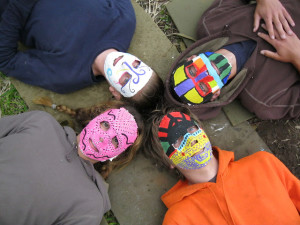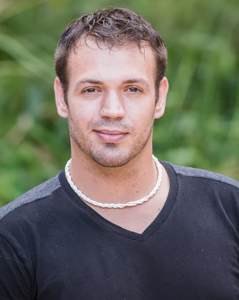By: Mike McGee, BS
Family Program Manager
For anyone who has participated in a Rites of Passage experience, structured or otherwise, one of the toughest tasks is explaining the significance to loved ones. The feeling of transformation or the significance of a falling leaf or animal encounter can be easily lost in translation. For students in wilderness therapy, the lack of words to express the significance can be frustrating. Having a Rites of Passage experience that includes an examination of the family unit and the family system itself allows for shared language, experience, and growth.

Rites of Passage at PQ
At Pacific Quest, our Family Program is an extension of our Rites of Passage experience. By examining our families through the lens of the Four Shields Model (an approach overviewed below), we are able to see the value and viewpoints of each phase of life. The Four Shields Model examines the joys and naiveté of childhood in the south shield, the identity formation and differentiation of adolescence in the west, the responsibility and drive found in adulthood in the north, and the simplicity and wisdom found in elder-hood in the east. Without a holistic view of the human experience, adolescent Rites of Passage can end up an extension of the unintended selfishness of childhood. And the true intent of a Rite of Passage is to not only benefit the individual but the community at large as well.
This is not just work for the adolescent. Our society often fails to see the value of viewpoints from our children, adolescents, and elders. Who hasn’t been moved by the joy and honesty found in children? Our music and art stems from the passion and pain found in our teenage years or the wisdom and strength of an elder who can listen and share from a place of experience. When we, as adults, fail to see the value of knowledge from the entirety of human existence, we can fall into the trap of monotony, money, and the mundane. One of my teachers shared that our primary purpose of adulthood is to show adolescents that being an adult is ‘worth it’. Adulthood and responsibility, when viewed through a nonlinear model are a choice, and why would anyone choose to be miserable?

Mike McGee, Family Program Manager
When I ask our students who the most impactful person in their life is, the most common response is a grandparent. They often see their parents as independent of their grandparents. Students often fail to see that their parents most likely had issues with their parents, and sought solace with their grandparents.
We work with our families to highlight the strengths and acknowledge the flaws in each generation’s way of thinking. I cannot count the amount of times a family has come back from their experience blown away by the newly articulated views of their children. Many parents and adults have lost the language of expression found in those tumultuous years. The rawness of feeling that has been tampered down to be polite and acceptable in all settings. And our students can walk away knowing that their voice has been heard and that the adults in their lives have their best interest in mind. Only by listening, are we able to finally hear the value in the other’s words.
Family + Rites of Passage: A Unified Approach
By: Mike McGee, BS Family Program Manager For anyone who has participated in a Rites of Passage experience, structured or otherwise, one of the toughest tasks is explaining the significance to loved ones. The feeling of transformation or the significance of a falling leaf or animal encounter can be easily lost in translation. For students …
By: Mike McGee, BS
Family Program Manager
For anyone who has participated in a Rites of Passage experience, structured or otherwise, one of the toughest tasks is explaining the significance to loved ones. The feeling of transformation or the significance of a falling leaf or animal encounter can be easily lost in translation. For students in wilderness therapy, the lack of words to express the significance can be frustrating. Having a Rites of Passage experience that includes an examination of the family unit and the family system itself allows for shared language, experience, and growth.
Rites of Passage at PQ
At Pacific Quest, our Family Program is an extension of our Rites of Passage experience. By examining our families through the lens of the Four Shields Model (an approach overviewed below), we are able to see the value and viewpoints of each phase of life. The Four Shields Model examines the joys and naiveté of childhood in the south shield, the identity formation and differentiation of adolescence in the west, the responsibility and drive found in adulthood in the north, and the simplicity and wisdom found in elder-hood in the east. Without a holistic view of the human experience, adolescent Rites of Passage can end up an extension of the unintended selfishness of childhood. And the true intent of a Rite of Passage is to not only benefit the individual but the community at large as well.
This is not just work for the adolescent. Our society often fails to see the value of viewpoints from our children, adolescents, and elders. Who hasn’t been moved by the joy and honesty found in children? Our music and art stems from the passion and pain found in our teenage years or the wisdom and strength of an elder who can listen and share from a place of experience. When we, as adults, fail to see the value of knowledge from the entirety of human existence, we can fall into the trap of monotony, money, and the mundane. One of my teachers shared that our primary purpose of adulthood is to show adolescents that being an adult is ‘worth it’. Adulthood and responsibility, when viewed through a nonlinear model are a choice, and why would anyone choose to be miserable?
Mike McGee, Family Program Manager
When I ask our students who the most impactful person in their life is, the most common response is a grandparent. They often see their parents as independent of their grandparents. Students often fail to see that their parents most likely had issues with their parents, and sought solace with their grandparents.
We work with our families to highlight the strengths and acknowledge the flaws in each generation’s way of thinking. I cannot count the amount of times a family has come back from their experience blown away by the newly articulated views of their children. Many parents and adults have lost the language of expression found in those tumultuous years. The rawness of feeling that has been tampered down to be polite and acceptable in all settings. And our students can walk away knowing that their voice has been heard and that the adults in their lives have their best interest in mind. Only by listening, are we able to finally hear the value in the other’s words.
Questions? Call or Text our Admissions Team: 808-937-5806